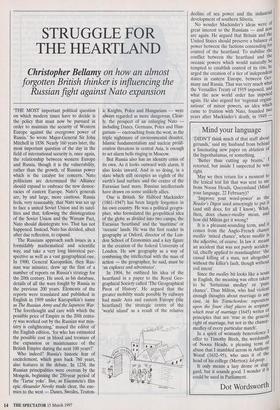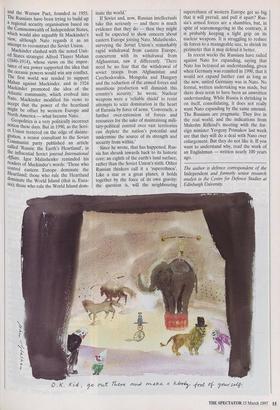STRUGGLE FOR THE HEARTLAND
Christopher Bellamy on how an almost
forgotten British thinker is influencing the Russian fight against Nato expansion
`THE MOST important political question on which modern times have to decide is the policy that must now be pursued in order to maintain the security of Western Europe against the overgrown power of Russia.' So wrote Major-General Sir John Mitchell in 1838. Nearly 160 years later, the most important question of the day in the field of international security is, once again, the relationship between western Europe and Russia, though it is the vulnerability, rather than the growth, of Russian power which is the catalyst for concern. Nato politicians are determined the Alliance should expand to embrace the new democ- racies of eastern Europe. Nato's generals are, by and large, more cautious. Russia feels, very reasonably, that Nato was set up to face a united Soviet Union and its satel- lites and that, following the disintegration of the Soviet Union and the Warsaw Pact, Nato should disintegrate too. That has not happened. Instead, Nato has decided, albeit after due reflection, to expand.
The Russians approach such issues in a formidably mathematical and scientific way, and take a very long historical per- spective as well as a vast geographical one. In 1900, General Kuropatkin, then Rus- sian war minister, drew up the first of a number of reports on Russia's strategy for the 20th century. He used, as his database, details of all the wars fought by Russia in the previous 200 years. Elements of the reports were translated and published in English in 1909 under Kuropatkin's name as The Russian Army and the Japanese War. `The forethought and care with which the possible price of Empire in the 20th centu- ry was worked out by the Russian war min- istry is enlightening,' mused the editor of the English edition, 'for who has estimated the possible cost in blood and treasure of the expansion or maintenance of the British Empire during the next 100 years?'
Who indeed? Russia's historic fear of encirclement, which goes back 760 years, also features in the debate. In 1238, the Russian principalities were overrun by the Mongols, beginning the 250-year period of the 'Tartar yoke'. But, as Eisenstein's film epic Alexander Nevsky made clear, the ene- mies to the west — Danes, Swedes, Teuton- is Knights, Poles and Hungarians — were always regarded as more dangerous. Clear- ly, the prospect of an enlarging Nato including Danes, Germans, Poles and Hun- garians — encroaching from the west, as the triple nightmare of environmental disaster, Islamic fundamentalism and nuclear prolif- eration threatens in central Asia, is enough to set alarm bells ringing in Moscow.
But Russia also has an identity crisis of its own. As it looks outward with alarm, it also looks inward. And in so doing, in a state which still occupies an eighth of the earth's land surface and the centre of the Eurasian land mass, Russian intellectuals have drawn on some unlikely allies.
One is British. Sir Hifford Mackinder (1861-1947) has been largely forgotten in his own country. He was a political geogra- pher, who formulated the geopolitical idea of the globe as divided into two camps, the Eurasian 'heartland' and the 'maritime' or `oceanic' lands. He was the first reader in geography at Oxford, director of the Lon- don School of Economics and a key figure in the creation of the federal University of London. He saw geography as a way of combining the intellectual with the man of action — the geographer, he said, must be `an explorer and adventurer'.
In 1904, he outlined his idea of the heartland in a paper to the Royal Geo- graphical Society called 'The Geographical Pivot of History'. He argued that the greater mobility made possible by railways had made Asia and eastern Europe (the heartland) the strategic centre of the `world island' as a result of the relative decline of sea power and the industrial development of southern Siberia. No wonder Mackinder's ideas were of great interest to the Russians — and now are again. He argued that Britain and the United States should preserve a balance of power between the factions contending for control of the heartland. To stabilise the conflict between the heartland and the oceanic powers which would naturally be tempted to establish control of its rim, he urged the creation of a tier of independent states in eastern Europe, between Ger- many and Russia. That was very much what the Versailles Treaty of 1919 imposed, and what the new world order has imposed again. He also argued for 'regional organi- sations' of minor powers, an idea which came to fruition with Nato, founded two years after Mackinder's death, in 1949 — and the Warsaw Pact, founded in 1955. The Russians have been trying to build up a regional security organisation based on the Commonwealth of Independent States, Which would also arguably fit Mackinder's view, although Nato regards it as an attempt to reconstruct the Soviet Union.
Mackinder clashed with the noted Unit- ed States strategist Alfred Thayer Mahan (1840-1914), whose views on the impor- tance of sea power supported the idea that the oceanic powers would win any conflict. The first world war tended to support Mahan against Mackinder, and in 1924 Mackinder promoted the idea of the Atlantic community, which evolved into Nato. Mackinder modified his views to accept that the power of the heartland might be offset by western Europe and North America — what became Nato.
Geopolitics is a very politically incorrect notion these days. But in 1990, as the Sovi- et Union teetered on the edge of disinte- gration, a senior consultant to the Soviet Communist party published an article called 'Russia: the Earth's Heartland', in the influential Soviet journal International Affairs. Igor Malashenko reminded his readers of Mackinder's words: 'Those who control eastern Europe dominate the Heartland; those who rule the Heartland dominate the World Island (that is, Eura- sia); those who rule the World Island dom- Mate the world.'
If Soviet and, now, Russian intellectuals take this seriously — and there is much evidence that they do — then they might well be expected to show concern about eastern Europe joining Nato. Malashenko, surveying the Soviet Union's remarkably rapid withdrawal from eastern Europe, concurrent with its withdrawal from Afghanistan, saw it differently. 'There need be no fear that the withdrawal of soviet troops from Afghanistan and Czechoslovakia, Mongolia and Hungary and the reduction of the armed forces and munitions production will diminish this country's security,' he wrote. Nuclear weapons were a 'reliable shield' to resist attempts to seize domination in the heart of Eurasia by force of arms. 'Conversely, a further over-extension of forces and resources for the sake of maintaining mili- tary-political control over vast territories can deplete the nation's potential and undermine the source of its strength and security from within.'
Since he wrote, that has happened. Rus- sia has shrunk inwards back to its historic core: an eighth of the earth's land surface, rather than the Soviet Union's sixth. Other Russian thinkers call it a `superethnos'. Like a star or a great planet, it holds together by the force of its own gravity: the question is, will the neighbouring superethnos of western Europe get so big that it will prevail, and pull it apart? Rus- sia's armed forces are a shambles, but, in spite of scaremongering to the contrary, it is probably keeping a tight grip on its nuclear weapons. It is struggling to reduce its forces to a manageable size, to shrink its perimeter that it may defend it better.
In recent weeks the Russians have railed against Nato for expanding, saying that Nato has betrayed an understanding, given when Germany was reunited in 1990, that it would not expand further east as long as the new, united Germany was in Nato. No formal, written undertaking was made, but there does seem to have been an unwritten understanding. While Russia is shrinking in on itself, consolidating, it does not really want Nato expanding by the same amount. The Russians are pragmatic. They live in the real world, and the indications from Malcolm Rifkind's meeting with the for- eign minister Yevgeny Primakov last week are that they will do a deal with Nato over enlargement. But they do not like it. If you want to understand why, read the work of an Englishman — written nearly 100 years ago.
The author is defence correspondent of the Independent and formerly senior research analyst in the Centre for Defence Studies at Edinburgh University.



































































 Previous page
Previous page